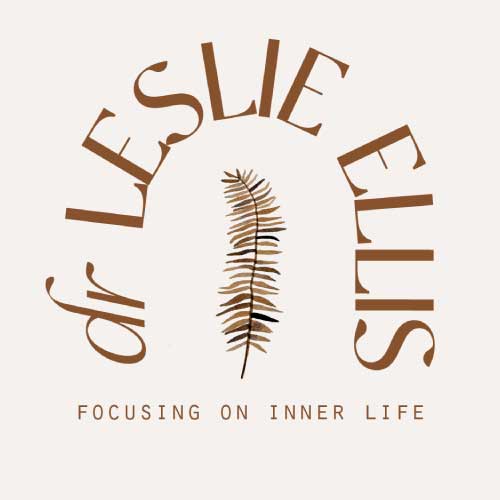EMBODIED EXPERIENTIAL DREAMWORK CERTIFICATION
This program is a deep dive into the world of dreams, and a clear path to learning how to engage yourself and guide others in embodied experiential dreamwork practices.
We are now opening the early registration for the September 2025 cohort. .

DREAMWORK
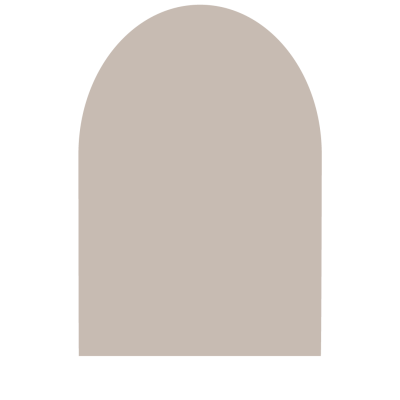
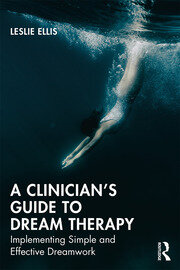
Upon completion of this program, you will be able to confidently engage with your own dreams and the dreams of others, both one-on-one and in groups. And you will be able to help those who suffer from trauma-related nightmares to not only reduce nightmare frequency and distress, but also PTSD symptoms.
This course is a companion to Dr. Leslie Ellis’ recent book, A Clinician’s Guide to Dream Therapy but goes beyond the material in the book to include personal and group dreamwork, and co-creative dreamwork.


For me, the experiential embodied dreamwork process is such a respectful, deeply meaningful, and soul feeding way of working with dreams. This way of accessing unconscious content feels deeply nourishing, healing, and transformative. I know I can trust this process. Since I started using this approach I’ve noticed many benefits. My capacity to witness myself and others has expanded. I’ve become more open to ‘not knowing’ and letting the process unfold in its own time. I am able to access my own inner resources with ease. I have deeper respect for and I’ve become very protective of my own and other people’s dreams. I wholeheartedly recommend this program.
-Sylvia Barnowski, artist and registered social worker
This course is aimed at mental health professionals and students working toward psychotherapy, counselling, social work or coaching certification, as well as those with a strong interest in dreams and dreamwork. It is also of interest to spiritual directors and those intending to lead dream groups.
This program is intended as an adjunct to the practice you already have, and it is up to each student to practice dreamwork within the scope of your own skills and training base. It is also not a substitute for therapy, although working with dreams is often therapeutic. If you have any questions about whether this program is for you, feel free to ask.
Scholarships: a limited number are available for those with large currency differentials.
WHO SHOULD ATTEND?
Who should attend?
This course is aimed at mental health professionals and students working toward psychotherapy, counselling, social work or coaching certification, as well as those with a strong interest in dreams and dreamwork. It is also of interest to spiritual directors and those intending to lead dream groups.
This program is intended as an adjunct to the practice you already have, and it is up to each student to practice dreamwork within the scope of your own skills and training base. It is also not a substitute for therapy, although working with dreams is often therapeutic. If you have any questions about whether this program is for you, feel free to ask.
A total of 30 APA-level CE CREDITS are offered for this program.
What our students say about the instructor(s)
My instructor was excellent! Leslie Ellis, provides such a safe place to explore dreams, balanced with didactic info, demos, and providing a sense of openness, that really supported learning.
Leslie has so so much knowledge but also this beautiful talent for attunement and sensitivity to track the dreamer’s internal life
10+! Leslie was brilliant! She was clear, flexible, so empathic. She created a lovely virtual space in which to be and work, and held each of us preciously when we shared.
Leslie is thoroughly knowledgeable, extremely skilled and competent, open and welcoming, responsive, flexible, clear, articulate, tech savvy, approachable.
Robbyn is also incredibly gifted. The sessions with her were such a helpful supplement and practice time.
To clinicians considering the course: you will develop foundational knowledge and confidence in your ability to navigate experiences where a client brings a dream but doesn't know what to make of it.
As a result of taking this program, I now move slower with my dreams and I feel more connected to figures and aspects that show up. I also feel more resourced in my work with dreams.
Something else I loved about this program is that it wasn’t formulaic, but process oriented which really supported the individual finding their own way. It was a nice blend of clinical and personal exploration.
I would also say another benefit is the small group size, because you really get to be in a safe and intimate space. It also provides an opportunity to try on others’ dream images and expand figures within your own dreamscape.
Art Therapist and Grief Counsellor
Professionally, I can offer clients these ways of helping them be with their dreams, particularly bad dreams and nightmares.
For those considering taking this program: it is well worth the time, energy and effort. There is so much specifically and practically to learn about dreams and how to work with them.

COURSE PACKAGE
COURSE PACKAGE
Online Instruction includes the following courses:
⚈Working with your OWN dreams
⚈Dreamwork Demystified, the clinical use of dreams, parts 1 and 2
⚈Working with Nightmares
Interactive instruction and practice
⚈Monthly dream group meeting
⚈Live demos and Q/A sessions
⚈Practice partnership to exchange dream sessions
⚈Online discussions, and bonus articles, videos and demos on topics of interest to the group
Assignments
⚈Dream journal (for yourself)
⚈Records of dream practice session, and questions and insights that arise
⚈Option to present a case study, video, paper, artwork on an aspect of working with dreams
Online Instruction includes the following courses:
⚈Working with your OWN dreams
⚈Dreamwork Demystified, the clinical use of dreams, parts 1 and 2
⚈Working with Nightmares
Interactive instruction and practice
⚈Monthly dream group meeting
⚈Live demos and Q/A sessions
⚈Practice partnership to exchange dream sessions
⚈Online discussions, and bonus articles, videos and demos on topics of interest to the group
Assignments
⚈Dream journal (for yourself)
⚈Records of dream practice session, and questions and insights that arise
⚈Option to present a case study, video, paper, artwork on an aspect of working with dreams
The September 2025 cohort is from 9:30 AM to noon PACIFIC, fourth Wednesday of each month, skipping August and December for a total of 10 classes.
Dates
Sept. 24, 2025
Oct. 22, 2025
Nov. 26, 2025.
Jan. 28, 2026
Feb 25, 2026
March 25, 2026
April 22, 2026
May 27, 2026
June 24 2026
July 22, 2026
Early Bird Pricing
Pay in full in advance- $2021 (GST and deposit included. Save $183.75)
Monthly Instalments- $183.75 deposit, plus 11 monthly instalments of $183.75 (includes tax)
Canadian Pricing (for Canadians only)
- Pay in full: $2772
- Monthly: $252 deposit and 11 payments
Scholarships: a limited number are available for those with large currency differentials.
Pay in full in advance- $2,205 USD (GST and deposit included. May 31). Save $183.75
Monthly Instalments- $183.75 deposit, plus 12 monthly instalments of $183.75 (includes tax)
Canadian Pricing (for Canadians only)
Pay in full in advance- $3,024 (includes GST and deposit). Save $252.
Monthly Instalments- $252 deposit (includes GST) and 12 monthly payments of $252
A deposit of $183.75 USD (or $252 CAD) is required to reserve your place in the class.
Pay via e-transfer (preferred) or paypal to le****@***********is.com
All prices are in US dollars. 5% GST is included.
The deposit is for administration and is non-refundable.
Scholarships: a limited number are available for those with large currency differentials.
Register now with a deposit to secure your place!
Refund Policy
Full refund (less deposit) up to 3 months’ prior to start date, 50% (less deposit) until one month prior to start date, and non-refundable after that. Extenuating circumstances considered.
Six-month Option for Integrative Focusing Therapy (IFT) Program
Students of the IFT program may attend the year-long dreamwork course for the first 6 classes and pay a pro-rated amount. Total for the program if paid in full in advance: $1,100 USD. If paid by instalments, cost includes a non-refundable deposit of $183.75 plus 6 monthly instalments of $183.75 for a total of $1,286.25. All taxes included. This is a non-certification track, so final presentations are not part of the assignments, but dream partnership practice is included.
ABOUT US
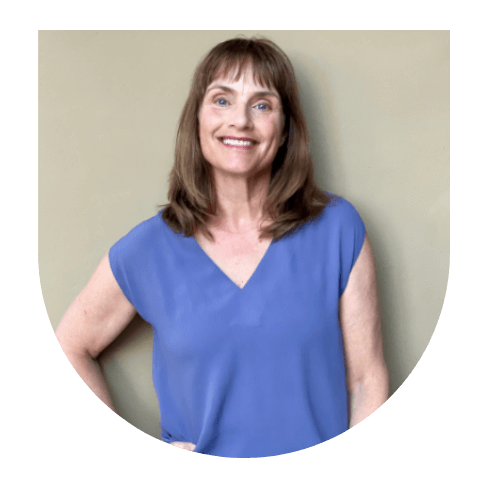
Dr. Leslie Ellis
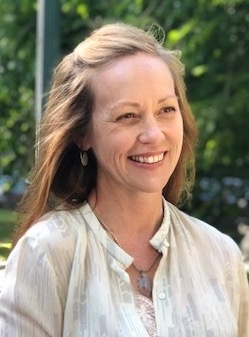
Robbyn Peters Bennett, LPC, CMHS
Robbyn is an early childhood trauma specialist and psychotherapist, a leading activist in ending corporal punishment in the United States, a positive parenting educator, a published researcher, and a certified trainer in the neurosequential model of therapeutics. Robbyn has studied Jungian psychology with the North Pacific Institute of Analytical Psychology and is currently studying Dr. Stephen Aizenstat’s method of dreamtending at Pacifica Graduate Institute.
Robbyn is a blessed mother and grandmother. She is an eclectic artist who is madly love with the beauty of life, enjoying stained glass, knitting, piano, jazz singing, gardening, cooking, bread making, sketching, sewing, home renovation, furniture painting, charcoal sketching and felt pin marker doodling! She is currently studying fashion design with the Portland Fashion Institute.
Robbyn appreciates the sentiment of James Hillman, that “Once we reawaken our aesthetic sense and are not anesthetized by all the distractions, we can appreciate the beauty in the world… and realize that our job on the Earth is to fall in love with it. Not just to love it, but to fall in love with it. And you only fall in love with it, if you’re aesthetically alive to it.”
For more on her work: https://robbynpetersbennett.org/about
ABOUT US
ABOUT US

Dr. Leslie Ellis

Dr. Leslie Ellis

Robbyn Peters Bennett, LPC, CMHS
Robbyn is an early childhood trauma specialist and psychotherapist, a leading activist in ending corporal punishment in the United States, a positive parenting educator, a published researcher, and a certified trainer in the neurosequential model of therapeutics. Robbyn has studied Jungian psychology with the North Pacific Institute of Analytical Psychology and is currently studying Dr. Stephen Aizenstat’s method of dreamtending at Pacifica Graduate Institute.
Robbyn is a blessed mother and grandmother. She is an eclectic artist who is madly love with the beauty of life, enjoying stained glass, knitting, piano, jazz singing, gardening, cooking, bread making, sketching, sewing, home renovation, furniture painting, charcoal sketching and felt pin marker doodling! She is currently studying fashion design with the Portland Fashion Institute.
Robbyn appreciates the sentiment of James Hillman, that “Once we reawaken our aesthetic sense and are not anesthetized by all the distractions, we can appreciate the beauty in the world… and realize that our job on the Earth is to fall in love with it. Not just to love it, but to fall in love with it. And you only fall in love with it, if you’re aesthetically alive to it.”
For more on her work: https://robbynpetersbennett.org/about

Robbyn Peters Bennett, LPC, CMHS
Robbyn is an early childhood trauma specialist and psychotherapist, a leading activist in ending corporal punishment in the United States, a positive parenting educator, a published researcher, and a certified trainer in the neurosequential model of therapeutics. Robbyn has studied Jungian psychology with the North Pacific Institute of Analytical Psychology and is currently studying Dr. Stephen Aizenstat’s method of dreamtending at Pacifica Graduate Institute.
Robbyn is a blessed mother and grandmother. She is an eclectic artist who is madly love with the beauty of life, enjoying stained glass, knitting, piano, jazz singing, gardening, cooking, bread making, sketching, sewing, home renovation, furniture painting, charcoal sketching and felt pin marker doodling! She is currently studying fashion design with the Portland Fashion Institute.
Robbyn appreciates the sentiment of James Hillman, that “Once we reawaken our aesthetic sense and are not anesthetized by all the distractions, we can appreciate the beauty in the world… and realize that our job on the Earth is to fall in love with it. Not just to love it, but to fall in love with it. And you only fall in love with it, if you’re aesthetically alive to it.”
For more on her work: https://robbynpetersbennett.org/about
What my students are saying...
It is with immense pleasure that I share with you my experience of this Experiential Dreamwork Certification Program that has captivated my curiosity and attention each and every day. I have been working with my dreams for over 30 years and have recorded 30 dream journals; however, this course has moved me so much farther in understanding my dream life that is so precious to me.
- Leslie is incredibly knowledgeable and always has lots to offer. I have found this course to be greatly helpful to me, both personally and professionally. This course is equipping me with the tools to work with a wide variety of clients on a much deeper level. Moreover, I have found it to be personally helpful as it has provided me with a platform to further engage with myself.
This program is multi-layered and I am learning so many new skills. I have been in this course approximately 3 months and have already learned so much, including: how to work with nightmares; how to work with my dreams on my own; how to participate in dream groups; how to find the life force found in my dreams; how to work with lucid dreams; and how to discover my blind spots when sharing my dreams. Most of all, I have gained skill in integrating Focusing while processing my dreams so that I can experience my dream more fully, embody useful elements of the dream and move the dream and myself forward.
Dr. Ellis is a very skilled facilitator and psychotherapist and is exceptionally knowledgeable about the vastness of dream work. She has written a cutting-edge dream book, A Clinician’s Guide to Dream Therapy: Implementing Simple and Effective Dreamwork that complements her online course, virtual classroom and group dream work. I feel very fortunate to be studying with her.
For me, this course is a fresh approach to the dream world. Beyond attempts for analysis and interpretation, it offers the opportunity to re-live our dreams and to receive all the gifts they bring. For me, it was surprising to learn that nightmares can also carry helpful elements and how there are ways to find them and listen to them. Throughout this journey, Leslie is a very warm and supportive teacher and the educational process of the course enables us to quickly bond as a team. I believe it is a fascinating experience for every dreamer.
As a mental health professional, I’ve found the techniques I learned in this course to be incredibly effective in reducing my client’s nightmare frequency and severity. But it’s not only for clinicians. Anyone can take it and help themselves have a better dream life, and better connection with their dreams. I’ve come to see how much dreams can bring help and resolution to a bunch of different aspects of one’s life. So that’s something I’ve really taken away. I just like loving dreams again.The course came at a time where I was having really, really frequent nightmares that were just terrifying. And they were happening maybe every 10 days. After our one-on-one session, it just went away and never had it again. That was that was really, really helpful. I couldn’t find a solution before that.
It’s been an amazing journey. I’ve always been passionate about dreams and with this approach I definitely feel a shift in how I work with dreams. There is such power for healing when we really attune to bodily sensations, when enter dreams in an experiential way. I find it very, very powerful. The finding of the helpful life force in the dream is a new technique for me and it’s really amazing. I find it that dreaming a dream forward gives that quality of more. My clients are really happy with the process as well. I can see it helping them move forward in their lives.
It is with immense pleasure that I share with you my experience of this Experiential Dreamwork Certification Program that has captivated my curiosity and attention each and every day. I have been working with my dreams for over 30 years and have recorded 30 dream journals; however, this course has moved me so much farther in understanding my dream life that is so precious to me.
- Leslie is incredibly knowledgeable and always has lots to offer. I have found this course to be greatly helpful to me, both personally and professionally. This course is equipping me with the tools to work with a wide variety of clients on a much deeper level. Moreover, I have found it to be personally helpful as it has provided me with a platform to further engage with myself.
This program is multi-layered and I am learning so many new skills. I have been in this course approximately 3 months and have already learned so much, including: how to work with nightmares; how to work with my dreams on my own; how to participate in dream groups; how to find the life force found in my dreams; how to work with lucid dreams; and how to discover my blind spots when sharing my dreams. Most of all, I have gained skill in integrating Focusing while processing my dreams so that I can experience my dream more fully, embody useful elements of the dream and move the dream and myself forward.
Dr. Ellis is a very skilled facilitator and psychotherapist and is exceptionally knowledgeable about the vastness of dream work. She has written a cutting-edge dream book, A Clinician’s Guide to Dream Therapy: Implementing Simple and Effective Dreamwork that complements her online course, virtual classroom and group dream work. I feel very fortunate to be studying with her.
For me, this course is a fresh approach to the dream world. Beyond attempts for analysis and interpretation, it offers the opportunity to re-live our dreams and to receive all the gifts they bring. For me, it was surprising to learn that nightmares can also carry helpful elements and how there are ways to find them and listen to them. Throughout this journey, Leslie is a very warm and supportive teacher and the educational process of the course enables us to quickly bond as a team. I believe it is a fascinating experience for every dreamer.
As a mental health professional, I’ve found the techniques I learned in this course to be incredibly effective in reducing my client’s nightmare frequency and severity. But it’s not only for clinicians. Anyone can take it and help themselves have a better dream life, and better connection with their dreams. I’ve come to see how much dreams can bring help and resolution to a bunch of different aspects of one’s life. So that’s something I’ve really taken away. I just like loving dreams again.The course came at a time where I was having really, really frequent nightmares that were just terrifying. And they were happening maybe every 10 days. After our one-on-one session, it just went away and never had it again. That was that was really, really helpful. I couldn’t find a solution before that.
It’s been an amazing journey. I’ve always been passionate about dreams and with this approach I definitely feel a shift in how I work with dreams. There is such power for healing when we really attune to bodily sensations, when enter dreams in an experiential way. I find it very, very powerful. The finding of the helpful life force in the dream is a new technique for me and it’s really amazing. I find it that dreaming a dream forward gives that quality of more. My clients are really happy with the process as well. I can see it helping them move forward in their lives.
MORE TESTIMONIALS...
I am always trying to improve my programs, so I asked my most recent cohort how their comfort level and ways of working with dreams have changed over the past year as a result of participating in my Embodied Experiential Dreamwork program. It is so gratifying to hear how many deepened and freed up their relationship to dreams.


‘Embodied Experiential Dreamwork Program ‘made me a better clinician’
I recently had a conversation with one of the recent graduates my year-long dreamwork program – looking for feedback and ways to talk about the program to prospective students. If you are considering the program, Shauna’s experience may help you decide if this is a fit for you.
Reading
📖Ellis, Leslie. (2019) A Clinician’s Guide to Dream Therapy: Implementing Simple and Effective Dreamwork. New York & London: Routledge.
📖Gendlin, E. T. (1986). Let Your Body Interpret Your Dreams. Wilmette, IL: Chiron Publications.
📖Gendlin, E. T. (1978/1981). Focusing. New York, NY: Bantam Books
Suggested Reading
📖Bosnak, R. (1998). A little course in dreams. Boston & London: Shambala.
📖Malinowski, J. (2021). The psychology of dreaming, London & New York: Routledge.
📖Bulkeley, K. (2017). An Introduction to the Psychology of Dreaming. Santa Barbara, CA: Praeger.
📖Specific additional reading will be assigned or suggested as the course progresses.
FAQ
The short answer is yes, you can do dreamwork even if you don’t recall dreams. But you will likely find that you recall more dreams as you pay more attention to them. I have written a blog post with some ideas about how to recall dreams. And I also teach some ways to cultivate waking dreams, and these can be used for practice in the course in the same way you would work with night dreams. This also works for clients who don’t recall dreams.
At minimum, you need to attend the monthly 2-hour class, or watch the recording if you are not able to attend in person — though it is highly encouraged to attend in person as often as possible. Outside of class time, you will have a dreamwork partner and are encouraged to work with each other’s dreams at least once a month. There are a couple of short books that are required reading. And there are several online courses you can consume at your leisure.
I have a suggested time-line of reading and coursework, but because my students are all adult learners and busy professionals, I want everyone to consume the material at their own pace, and to enjoy the process. Of course, the more time you put in, the more you will get from the course material, but I leave that up to each individual.
I do offer a discount in specific cases — mainly for those who reside in countries where the currency differential would render the tuition out of reach. There are a limited number of discounted spaces, and candidates will be considered in a case by case basis.
While this course is aimed at those who want to use dreamwork in clinical practice, it is open to all with a strong interest in working with dreams — their own, or the dreams of others. It may appeal to spiritual directors, coaches and anyone with a deep interest in exploring the fascination world of dreams.
The monthly meeting will be a 2.5 hour session that will typically begin with a brief Q/A. Then we will talk about a specific dream practice, topic or theory, I will demonstrate the dreamwork method with a class member or two, and then break you into smaller groups to try it out. Then we debrief the experience. There may be sessions where we stay together as a large group to learn and experience dream group process.
In addition, I will create a dreamwork exercise based on each month’s learnings for you to try with your small group — you will be assigned to a dyad or triad to meet over the year between classes to practice what we are learning together. There will also be an option for the small groups, or the whole group to continue meeting after the year is over.
There is one assignment to present on any aspect of dreamwork that intrigues you, and the format for this is very open. Most students have offered a short presentation (10-15 minutes) or led a class exercise/discussion. You can also write, film or record what you want to share. But these are not formally assessed. if you attend classes, engage in the dreamwork practices assigned, do the reading and courses that are part of the program, you will qualify for certification. If you would like to record a dreamwork session for feedback and a more formal assessment, that is an option.
Yes, this course will be recognized by the IASD as it follows the ethical dreamwork certification guidelines closely.
This course is a stand-alone course. There is a related course offering on how to understand and treat nightmares that I would recommend for all of those doing clinical dreamwork. And graduates can continue is a quarterly dream circle for those who have completed the program. If there is enough interest, ad advanced dreamwork certificate may be offered in the future.
The short answer is yes, you can do dreamwork even if you don’t recall dreams. But you will likely find that you recall more dreams as you pay more attention to them. I have written a blog post with some ideas about how to recall dreams. And I also teach some ways to cultivate waking dreams, and these can be used for practice in the course in the same way you would work with night dreams. This also works for clients who don’t recall dreams.
At minimum, you need to attend the monthly 2-hour class, or watch the recording if you are not able to attend in person — though it is highly encouraged to attend in person as often as possible. Outside of class time, you will have a dreamwork partner and are encouraged to work with each other’s dreams at least once a month. There are a couple of short books that are required reading. And there are several online courses you can consume at your leisure.
I have a suggested time-line of reading and coursework, but because my students are all adult learners and busy professionals, I want everyone to consume the material at their own pace, and to enjoy the process. Of course, the more time you put in, the more you will get from the course material, but I leave that up to each individual.
I do offer a discount in specific cases — mainly for those who reside in countries where the currency differential would render the tuition out of reach. There are a limited number of discounted spaces, and candidates will be considered in a case by case basis.
Yes, this course is eligible for 30 CE credits recognized by APA.
While this course is aimed at those who want to use dreamwork in clinical practice, it is open to all with a strong interest in working with dreams — their own, or the dreams of others. It may appeal to spiritual directors, coaches and anyone with a deep interest in exploring the fascination world of dreams.
The monthly meeting will be a 2.5 hour session that will typically begin with a brief Q/A. Then we will talk about a specific dream practice, topic or theory, I will demonstrate the dreamwork method with a class member or two, and then break you into smaller groups to try it out. Then we debrief the experience. There may be sessions where we stay together as a large group to learn and experience dream group process.
In addition, I will create a dreamwork exercise based on each month’s learnings for you to try with your small group — you will be assigned to a dyad or triad to meet over the year between classes to practice what we are learning together. There will also be an option for the small groups, or the whole group to continue meeting after the year is over.
There is one assignment to present on any aspect of dreamwork that intrigues you, and the format for this is very open. Most students have offered a short presentation (10-15 minutes) or led a class exercise/discussion. You can also write, film or record what you want to share. But these are not formally assessed. if you attend classes, engage in the dreamwork practices assigned, do the reading and courses that are part of the program, you will qualify for certification. If you would like to record a dreamwork session for feedback and a more formal assessment, that is an option.
Yes, this course will be recognized by the IASD as it follows the ethical dreamwork certification guidelines closely.
This course is a stand-alone course. There is a related course offering on how to understand and treat nightmares that I would recommend for all of those doing clinical dreamwork. And graduates can continue is a quarterly dream circle for those who have completed the program. If there is enough interest, ad advanced dreamwork certificate may be offered in the future.
If you have any questions that are not answered here, contact us or email me at le****@***********is.com
